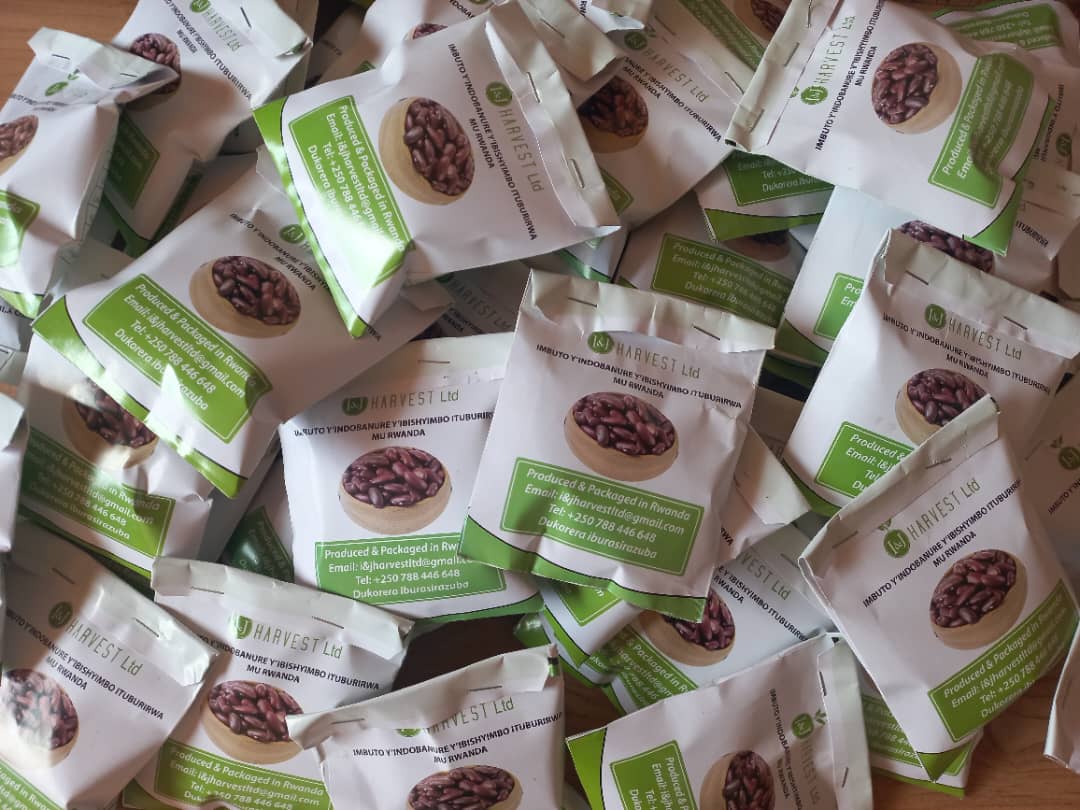
Small packs of Bean seeds designed with information on seed characteristics
Small tends to be underrated. Yet it can be tremendously successful. Initially skeptical, market actors have now embraced the village-based advisor (VBA)/small-pack approach in their marketing strategy
Seed systems in the Great Lakes Region are still at the nascent stage, characterized by diversity in actors, and in production and distribution models. These models span from government-led production and distribution in Burundi to a private sector-led and government-enabled approach in Rwanda, while DRC relies heavily on imports and informal systems. Small companies and cooperatives involved in seed production – albeit with limited marketing and distribution operations – are common across all three countries. Indeed, most of them sell their produce in bulk to the government, relief agencies and non-governmental organizations. Consequently, farmers remain largely unaware of new technologies, and innovative products are not always locally available when needed.
In light of this, the Great Lakes Accelerated Innovation Delivery Initiative Rapid Delivery Hub (AID-I GLR) introduced the ‘village-based advisor/small pack’ approach. In this approach, as an integral part of their promotional activities for market expansion, seed companies or producers and other selected input providers run mother demonstration plots and package inputs (e.g., seeds, veterinary products, fertilizers, and soil amendments) in small packs for broader and more proactive distribution to smallholder farmers, along with advisory information. The mother demonstration plot, managed by a village-based advisor (usually a lead farmer) serves for learning purposes, demonstrating the new technology’s benefits as well as the technical know-how to assure success. The small pack is provided to farmers learning the ‘how-to’ at the mother demonstration plot to thereafter practice and test on their farms.
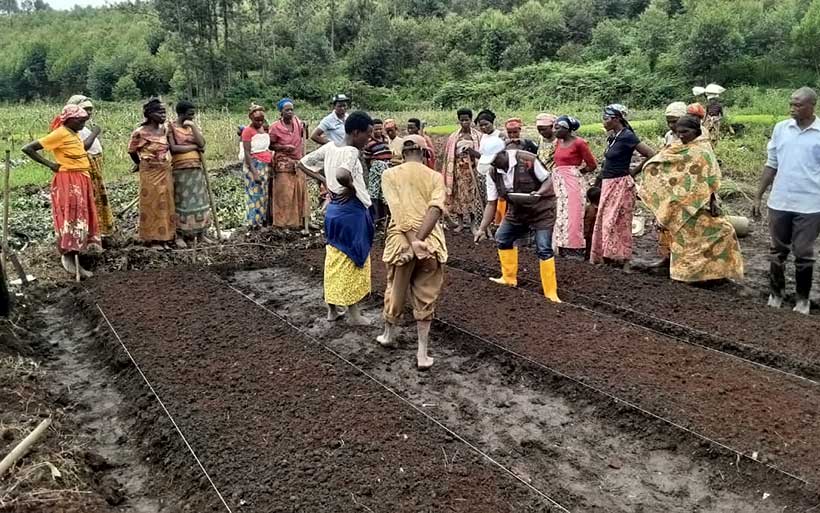
In Buhiga District, Karusi Province, Burundi, after receiving small packs to test in their small plots at home, farmers are actively observing and learning about good agronomic practices at a demonstration plot for rice farming
In Burundi, Rwanda, and the Democratic Republic of Congo (DRC), AID-I GLR trained seed companies on the approach, and supported them in its implementation. This was through delivering certified, climate-smart, and clean seed varieties in small packs of 100 grams to farmers, accompanied by training and information kits on good agronomic practices.
Initially, there was resistance to the approach from nearly all quarters – seed companies, farmers, and in some cases, local authorities. Their main concern was that the quantity would be insufficient to substantially demonstrate effectiveness in farmers’ fields. However, following a training and experience-sharing session facilitated by Seed Systems Group through Farm Input Promotions Africa (SSG/FIPS-Africa) in Nairobi, extension managers successfully conveyed the benefits of the approach to their leaders.
And after just a single agriculture season of implementation, there have already been positive outcomes, leading to increased interest and adoption by market actors, farmers and the public. The approach has also proven successful in giving farmers a firsthand experience of seed performance in their own fields.
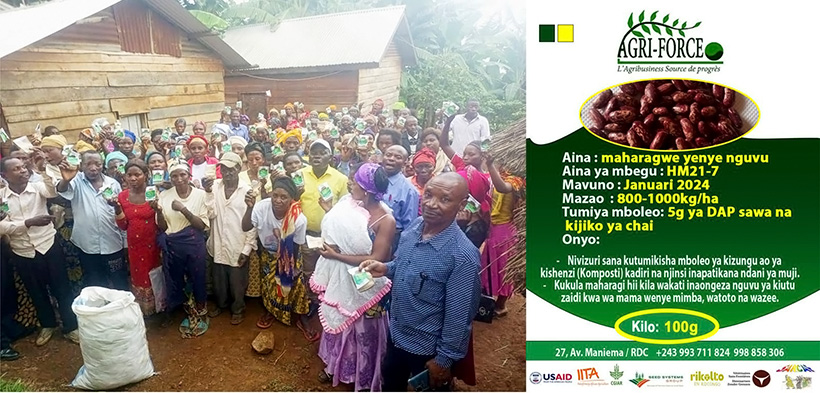
Small packs distributed to farmers in DR Congo branded with information detailing the characteristics of the seeds
Market actors have widely embraced the small-pack approach. During the previous season (2024A), seed companies played a significant role in increasing the distribution of small packs to farmers. In Rwanda, seed companies contributed nearly half (42%) of the total number of small packs distributed. This was a direct market response: ever market-conscious, seed companies had noticed the growing demand for small packs, and decided to supplement the quantities provided by AID-I GLR. For instance, I&J Harvest produced an additional 6,500 kilos of high-iron bean seeds on top of the initial 7,000 kilos provided by AID-I GLR. Similarly, KGB Seed Company supplemented the initial 6,000 kilos of hybrid maize seed with an additional 5,500 kilos.
In DRC, AGRI-FORCE seed company has also supplemented the small packs delivered to farmers. “Thanks to this integration, in the 2023B season, we produced and distributed approximately 26,000 seed packs of beans. Demand increased in the 2024A season, leading us to produce up to 30,000 small packs as part of the project,” revealed AGRI-FORCE’s CEO Herman Mutabataba. “In addition, we produced an extra 16,000 small packs, totalling 46,000 small packs of high-iron beans. Furthermore, a total of 81,600 small packs and 50,000 of maize seed were distributed respectively in the 2024 A and B seasons.”
What are market actors and farmers saying about the small-pack approach?
Jacques Tuyishimire, Managing Director of Holland Green Tech, a vegetable seed company in Rwanda, emphasized the shift in their marketing strategy to integrate small packs, with encouraging feedback from farmers and an expanded market reach.
“We were accustomed to packaging vegetable seeds for larger farmers, not small packs. This project opened doors to smallholder farmers, providing a new avenue to expand our business and cater to a broader clientele with small packs,” he said. “The positive feedback received from farmers during the small pack testing in phase 1 has inspired us to adapt and revise our marketing strategy. We are now actively planning to include small packs in our product line, to ensure our products reach a diverse market.”
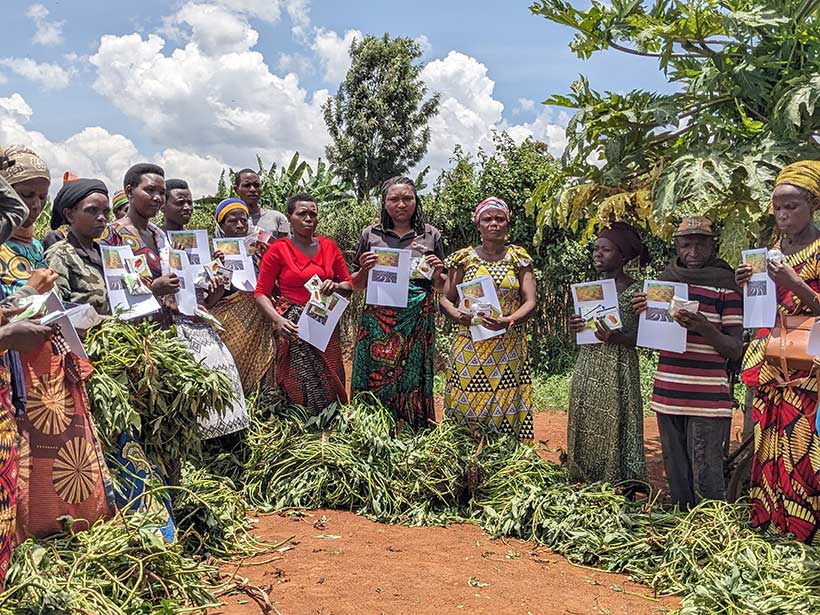
Farmers in Burera District, Rwanda, received small packs of orange-fleshed sweet potato vines, along with flyers containing key information about the seeds, to test in their small plots.
Richard Hatungimana, CEO of Coop Eden, a farmer cooperative and seed company in Burundi, spoke of the company’s eye-opening transformative experience with the small-pack approach. In his words…
“When the small pack approach was introduced, I had limited knowledge about it. I thought the project brought money to buy seeds for distribution as charity to vulnerable households in communities.
I seized an opportunity for training in Kenya by SSG/FIPS-Africa, where we were trained on the implementation of the VBA/small-pack approach.
After the training, I gained a profound understanding of the small-pack technology used by the Kugwiza project, the AID-I GLR nickname in Kirundi, that means ‘to increase’. It’s not just about distribution but equipping me with innovative approaches to market my seeds, to ultimately increasing demand. Farmers to whom I provided small seed packs of 100 grams of improved high-iron beans appreciated the yields, harvesting between 2 and 3 kilos. Most of them returned to order for more seeds due to their satisfaction. As a result, I’ve increased sales by 1.5% through the small-pack approach.
We have integrated the small-pack approach into our marketing system. Indeed, when a customer comes to buy any quantity of one or two varieties, we offer them one or two small packs of improved varieties as a bonus to give them an opportunity to test the new varieties. This will allow them to compare yields and decide which variety to buy in the future.”
Herman Mutabataba, CEO, AGRI-FORCE seed company in DRC, adds, “In my opinion, this approach is effective because it allows farmers to form personal opinions on the seeds. Additionally, it enables us to reach a large number of Farmers quickly. Information spreads fast and in real-time. The small-pack approach is gradually being integrated into our marketing strategy, where sales agents serve as the primary link between farmers and AGRI-FORCE.”
How have market actors responded to farmers’ demands after witnessing the benefits of the technologies?
The adoption of improved inputs among farmers has been significantly stimulated by continuous exposure to new agricultural technologies in the two previous seasons.
The positive response from farmers is amply reflected in increased orders for seeds, leading to heightened engagement with agrodealers as an integral part of the marketing strategy. This strategic collaboration ensures the availability of improved seeds at input shops, thereby enhancing accessibility for farmers.
In Rwanda, through effective links and engagement, more than 30 new agrodealers have been successfully enlisted by seed companies and input suppliers in the areas where farmers were exposed to new technologies during the last season. This collaboration has resulted in the supply of 59.6 metric tons of improved seed and 2,965 metric tons of lime to agrodealers, who have delivered them to farmers for planting during season A 2024.
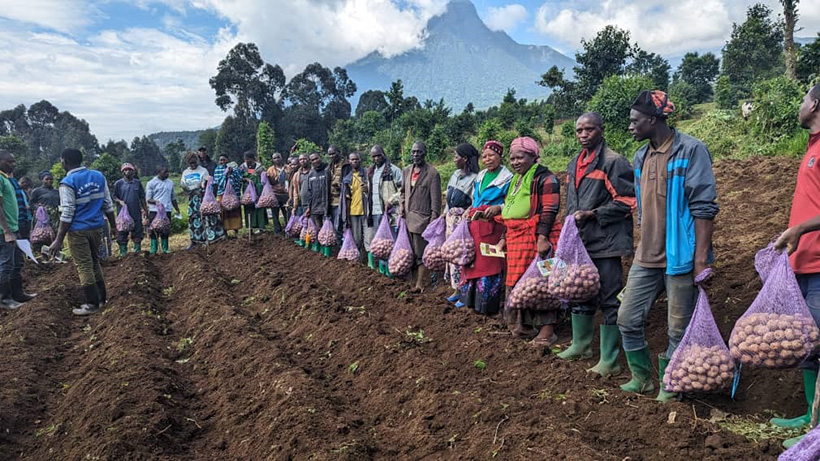
Farmers in the Northern Province of Rwanda received improved potato seeds and were trained in good agronomic practices at a demonstration plot.
Furthermore, the impact of exposing more than 300,000 individual farmers in Rwanda to improved seeds of potatoes, high-iron beans, maize, and orange-fleshed sweet potatoes (OFSPs) is plainly evident. As a direct result of this exposure, these farmers have collectively placed orders for more than 515 metric tons of seeds of high-iron beans, vegetables, hybrid maize, and potatoes, as well as up to 500,000 cuttings of OFSPs and 284 metric tons of lime. The combined market value of all these is USD 769,988. This reflects a substantial increase in both demand and market share, and convincingly demonstrates the success – and sustainability – of this initiative.
In addition, seed and lime companies expanded their markets into new geographies. For instance, I&J seed company penetrated the seed market in four new districts (Nyamasheke, Kayonza, Rwamagana, and Ngororero) with high-iron beans, while MULMECO – a lime producer – started business in Rutsiro and Gicumbi Districts, and KGB Seed Company started seed production of hybrid maize in Nyamasheke as results of intervention.
In Burundi, Richard Hatungimana, CEO of Coop Eden recalls, “When I started working with the Kugwiza Project during the 2023B season, I distributed 160,000 small packs of high-iron bean seeds, weighing 16,000 kilos. During the subsequent planting season (2024A), it was evident that farmers were highly satisfied with the performance of the seeds. As a result, they independently placed orders and purchased up to 24,000 kilos of high-iron bean varieties.”




No Comments